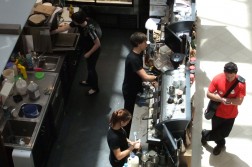Those of you who read my work regularly and send me letter-bombs will know that I am a citizen of the magical suburb of Cranbourne, in the picturesque and cow-infested city of Casey. Now, I think it’s fair to say that in the past Cranbourne has not pushed itself to the foreground of Australia’s wide municipal tapestry. Oh, we had our attractions: the fake meteorites on strings, for example; the drive-through Subway; and…the list goes on. But until now, all of Cranbourne’s myriad wonders have been overshadowed by little things like shallow suburban stereotypes and the stampedes of residents fleeing for their lives from the great clouds of poisonous gas rising out of the ground.
It’s so gratifying, then, for someone like me who has believed in this town so long, to find that Cranbourne is finally on the map for all the right reasons, which can be summed up in two sweet, fragrant words: midget racing.
Yes, it is Cranbourne, quaint unfashionable little Cranbourne, that has shown the guts and imagination needed to make "the great leap forward" in the Australian racing industry.
For years and years the Melbourne Spring Racing Carnival was a staid, dry event, suffering from a lack of vibrancy and an over-reliance on horses to provide the entertainment. It seemed that the organisers of the carnival had long forgotten the first rule of the events management business: Horses are boring as hell.
Now I confess that when I first heard about the midget racing event at Cranbourne, I was a tad sceptical. When it comes to racing, I am essentially a traditionalist, and as such usually prefer dwarves to race in the more conventional way — wearing muzzles and chasing an electrified rabbit. But having glimpsed a snippet of the recent action, I can affirm that, like a crusty old Test-match enthusiast who sees a Twenty20 game and instantly abandons his devotion to actual cricket, I am now crazy for the piggybacks.
Controversy has, as usual, ensued. It seems like one cannot do anything nowadays without attracting politically correct whines from someone or other. Whether it’s running about with a dwarf on your back, or dressing up like a golliwog or punching an Indian, our every move is being tracked and squawked at by the PC parrots. What they don’t realise in their obsessive drive to demonise hard-working little people and the sturdy punters who hoist them aloft is that midget racing could well be the last hope of a great Australian industry.
You see, those in charge of horse racing in Australia have been living for many decades with a secret, nagging fear. It keeps them awake at night. It affects their family life. They are snappy and rude to loved ones. They are forgetful and irritable at work, because of this deep, hidden terror that they carry with them always, like a saddlebag full of dread. Because everyone who makes a living from horse racing is just counting down the days until their livelihood is cut off — the day that the Australian public wakes up, takes a deep breath, and says to itself, "Wow … horse racing’s a bit crap, isn’t it?"
It’s the understandable fear that one day, en masse, everyone will see through their paper-thin attempts to dress horse racing up as a "sport", and return to real sports, sports where the athletes are actually aware they are competing.
I mean, it’s all a bit silly, isn’t it? Nobody has to whack Libby Trickett with a whip to get her to go faster. We all wish someone would, but nobody has to. You know, when the Australian rugby team runs out to play the All Blacks, they don’t require a small man to sit on them and squeeze his thighs together to give their best. No, they get out there, give their all, lose, and go home, satisfied in the knowledge of an honest and inept day’s work.
I mean, do people realise this? Do they realise that these horses aren’t out there thinking, "Come on, 500 more metres to glory, and the Cup will be mine! Wait till I tell my grandfoals!" They’re actually thinking "AAAAAAAAAAAAAAAAAAAAAAAAAAAAAAAAAAAAAAAHHHHHHHHH". That’s all they can think — they’re horses, for Christ’s sake.
Nobody even pays attention to racing except during the Spring Carnival. They keep reporting race results for the rest of the year, but nobody knows whether these races actually occur: the racing clubs could just sit around 10 months a year doing Jaegerbombs and drawing giant genitals on the horses with chalk for all we know; nobody actually goes.
No, to actually attend the races, you need more than just a race. You need glamour. You need fashion parades. You need huge, terrifying hats that look like they were constructed by a mental patient who stumbled upon a bowerbird’s nest while under the influence of GHB. You need major corporations to pay stunning amounts of money to fifth-billed cast members of American soap operas and people who once went bowling with Kim Kardashian to stand in marquees staring blankly at people and looking around for a security guard to come over and remove Richard Wilkins.
You need obnoxious sunburnt young women in hideous shiny dresses originally designed to teach female anatomy to medical students, staggering around vomiting in flowerbeds and waggling their stupidly heeled shoes over their shoulders because they started hurting their feet 30 seconds into the day, by which time they had already ingested four glasses of champagne and the unique genetic material of at least one complete stranger with a frosty-tipped mohawk and a poorly fitting suit that only comes out twice a year (once for the races and once for the subsequent court appearance) before passing out on the train and waking up three stops past their home with an empty handbag and a thin coating of hobo-hair all over their face.
But most of all, you need betting. Unlike other sports, the thrill in horse racing is not so much participation, or watching, or displaying the slightest bit of interest in the running of the race; the thrill, rather, is in the intoxicating tension and giddy excitement of losing all your money.
Of course, there is gambling in other sports. One of the joys of watching rugby league, for example, is crouching three inches in front of the television screen, squinting in an attempt to make out the words "gamble responsibly" at the bottom of the in-game betting commercials. But what sets horse racing apart from the pack is that, whereas in most sports gambling is just a way to enhance the action with a little bit of personal investment and the frisson of looming bankruptcy, in racing gambling is the entire reason for the sport’s existence.
Well, OK, that’s maybe not quite fair. The reason for the sport’s existence is actually so that developmentally delayed television personalities can compete with each other to see who can use the phrase "fillies of the two-legged kind" the most times in a four-hour period. But gambling is still pretty important. The horse racing industry is a lot like a gigantic poker machine, only without the flashing lights and sense of moral rectitude.
And the thing is, everyone in racing knows all this. They know racing’s rubbish; they just keep doing it because they have no other marketable skills and find horses to be the only socially acceptable way to satisfy their desire to hit things. They just don’t want you to figure this out. And neither should you, really — the collapse of the racing industry would result in a catastrophic plunge in the Australian economy, the loss of thousands of jobs, and the release of Gai Waterhouse into the community.
And this is why we should all be embracing the advent of midget racing. Because it is everything that horse racing isn’t — compelling, exciting, genuinely athletic, and in possession of that crucial human factor that you can only get by putting a small person on a big person’s back and yelling "GO!" And as professional dwarf Jeremy Hallam points out, it is not in the least degrading to little people to see the broader community bending double in gales of laughter at the hilarity of their physical shortcomings. No more degrading than Hallam’s business, Dwarfmyparty.com, which allows you to hire dwarfs "for a range of events" — parties, christenings, orc-fights, etc. And I for one will be visiting it right after I finish writing this, to get a few dwarves in for my next dinner party. Add a touch of class, etc.
So do not fear dwarf racing. If we are to have any hope of sustaining the racing industry in the face of growing concern that horse racing is cruel, corrupt and as exciting as eating half a cold potato, we must innovate. We must move with the times. We must think outside the square. We must, in short, get under a dwarf and run like the wind.
Donate To New Matilda
New Matilda is a small, independent media outlet. We survive through reader contributions, and never losing a lawsuit. If you got something from this article, giving something back helps us to continue speaking truth to power. Every little bit counts.



